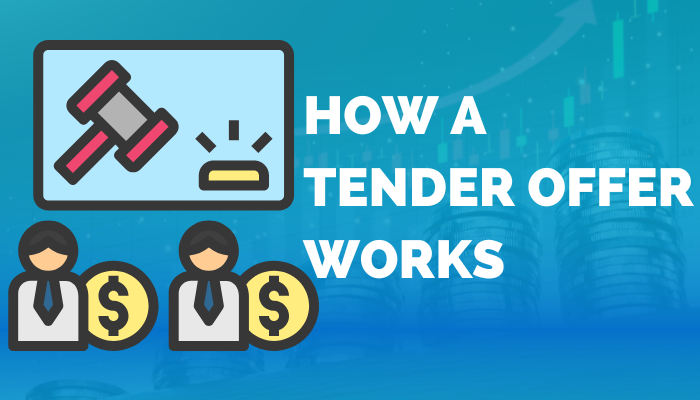
Tender Offer
It is an offer to buy all or part of the stock held by shareholders in a corporation.
A tender offer is an offer to buy all or part of the stock held by shareholders in a corporation. Most of the time, these offers are issued publicly and ask owners to sell their shares for a predetermined price and within a predetermined window.

The offered price is typically above the market price and is frequently subject to a minimum or the maximum number of shares sold.
Inviting bids for a project or accepting a formal offer, such as a takeover proposal, is referred to as a tender. An exchange offer is a specific tender offer in which shares are exchanged for securities or other non-cash alternatives.
- It is an open invitation to all shareholders to tender their shares at a set price and during a certain window.
- To give shareholders a stronger incentive to sell their shares, it is often established at a higher price per share than the company's existing stock price.
- When a takeover attempt is made, the tender can be subject to the potential buyer being able to acquire a specific number of shares, such as those needed to form a majority stake in the business.
Shareholders are significantly more motivated to sell their shares since the party intending to purchase the equities is prepared to offer them a sizable premium above the current market price per share.
How do tender offers work?
When an investor offers to acquire shares from each shareholder of a publicly traded firm for a specific price at a specific time, this is known as a tender offer.

Typically, the investor provides a higher price per share than the company's stock price, giving stockholders more incentive to sell their shares.
Most offers are made at a set price that is markedly higher than the share's existing price. For example, if the market price of the outstanding stock is just $15 a share, an offering could be made to buy them for $20 each.
The premium is being offered to persuade as many shareholders as possible to sell their shares.
When a takeover attempt is made, the tender can be subject to the potential buyer being able to acquire a specific number of shares, such as those needed to form a majority stake in the business.
A publicly traded corporation may make a tender offer to repurchase any outstanding shares of its stock.
A hostile takeover can occur when a privately held or publicly traded corporation launches an offering to shareholders without the board of directors' approval (BOD).
Hedge funds, private equity organizations, management-led investor groups, and other businesses are examples of acquirers.
Because the offer takes time to complete and may not ultimately occur, a target company's shares typically trade below or at a discount to the offer price the day after the announcement.
The spread narrows typically as the closure date approaches and problems are handled.
Any business or person purchasing 5% or more of a company is required by Securities and Exchange Commission (SEC) laws (at least for U.S. equities) to report their ownership to the SEC, the target company, and the exchange.

Typically, tender offers are put forth in the hopes that a prospective buyer will amass enough common stock to either gain a significant presence or fully take control of the board of directors.
From the acquirer's standpoint, one advantage of a takeover bid is that if the acquirer owns a sufficiently large portion of the existing stock, they can compel all remaining stockholders to sell their shares and take the firm private.
Even if the first offer is rejected, they can merge it into another publicly traded company.
To put it another way, it might make it a subsidiary of a holding company, and only the holding company would own any stock in the newly acquired business.
This offer is frequently utilized when management and the board of directors oppose a takeover because they don't think it would be in the shareholders' best interests.
In light of this, it is a method for acquirers or investors who want to take over the company but are opposed by the current directors and executives.
Regulations
In the U.S., there is a lot of regulation around tender proposals. These laws are intended to safeguard investors, maintain the efficacy of the capital markets, and provide a set of guidelines ensuring the stability of the target company such that it can respond.

In particular, The Williams Act and SEC Regulation 14E both have jurisdiction over tender bids. Let's examine each.
The regulations offer the companies a base from which to respond to any prospective takeover bids. There are numerous rules governing tender proposals, but two stand out as the harshest.
A modification to the Securities Exchange Act of 1934 is the Williams Act. The later bill is still regarded as one of the most important securities laws ever passed in the United States.
The Securities Exchange Act was not amended to include the Williams Act until 1968 when New Jersey Senator Harrison A. Williams recommended the change.
The Williams Act lays forth procedures for any person, team, or organization attempting to buy shares to take over the target corporation. The act aims to create an equitable capital market for all users.

It is also accountable for giving the board of directors of a company the time they require to assess whether the offering is advantageous or detrimental to the company and its shareholders and for making it more straightforward for them to reject the offer.
The U.S. Securities and Exchange Commission's (SEC) Regulation 14E is the second notable regulation (SEC). This regulation established the guidelines that any person making an offering to buy most of a company's stock must abide by.
One such restriction prohibits anyone from making an offer unless they are certain they will have the funds necessary to complete the transaction. This is since doing so would cause the stock price to vary greatly and make it simpler for price manipulation in the market.
The legislation also addresses several additional topics, such as:
- Additional illegal tender offer procedures
- Securities transactions are based on substantial, non-public information when offerings are considered.
- Transactions that are not permitted following partial tender proposals
- Interactions outside of the offerings are prohibited
Benefits and drawbacks
One important benefit is that the investors making the offer are not obligated to purchase shares until they receive the required minimum number of shares. The requirement for initial financial outlays is gone. Additionally, it prevents investors from selling their stock if the offer is rejected.

Investors can choose to incorporate clauses like the escape clause. Then, if regulators reject the merger, it frees them from the need to purchase shares.
Adding escape clauses releases acquirers from responsibility for purchasing the shares. For instance, the acquirer can decline to purchase tendered shares if the government rejects a proposed acquisition due to antitrust issues.
If shareholders accept such offers, investors frequently take control of the target companies in less than a month.
As a result, they also typically make higher returns than typical stock market investors.
Even though these offers have many advantages, there are some obvious drawbacks. First, because investors must pay SEC filing fees, legal expenses, and other costs associated with specialist services, a tender offer is a costly approach to conducting a hostile takeover.
Depository banks must validate tendered shares and make payments on the investor's behalf, which can take time.
Additionally, the offer price could climb if additional investors join a hostile takeover, and because there are no guarantees, the investor could lose money on the deal.

These offers require a time commitment. It is a process rather than an event.
An investor must wait for the depository bank to confirm the tendered shares before it may make payments on the investor's behalf. This entire process could take a sizable period.
Types
Typically, these offers are separated into several distinct categories:
1. Mandatory
A stakeholder who gains new control over the company or purchases more than 30% of its shares is subject to a mandatory bid rule that mandates them to purchase the remaining shares on the same favorable conditions as their prior purchase.
In this instance, the person making the offer is compelled to do so for the remaining shares of the target company. This is necessary because, in the absence of such action, this large shareholder may exploit their ability to cast votes and make voting decisions for personal gain at the expense of other shareholders.
2. Voluntary
This is when a company voluntarily decides to submit an offering. In most cases, neither internal nor external forces are present to start it.
3. Friendly Tender offer
The board of directors (BOD) is typically advised of the intention to make an offer for the target company's outstanding shares in this type of tender. After that, the board can proceed with informing the shareholders of its plans.

The BOD must then inform the shareholders whether or not they should accept the offer. This becomes a friendly offer if the board endorses it and the shareholders agree to sell all of their shares.
4. Hostile tender offer
In this scenario, the offeror fails to notify the target company's BOD of his or her plan to present the offer.
In this instance, the person intending to purchase shares keeps the tender open to the public without considering the board's view on the offer. Since there is no agreement between the two parties in this instance, the offer is hostile.
5. Mini-Tender
This occurs when a bid is made to purchase less than 5% of the company's stock. Usually, current investors are contacted directly for this. The Security Exchange Act does not regulate mini-tenders because there are no mentioned requirements in the disclosure.
Approving and rejecting offers
You must submit your instructions by the cutoff date if you accept a tender offer; otherwise, you will not be permitted to participate.
Here's an example of the process:
Usually, you have to inform your broker, "Sure, I'll sell out at $65 per share," over the phone, in person, or via the brokerage website, and then wait to see what happens. (Of course, it's a completely different process if you have physical stock certificates, but those are getting harder to find nowadays.)

Upon completing the transaction, you will notice that the 1,000 shares of Company ABC have been removed from your account, and a deposit of $65,000 cash has been made. This happens if the offering is successful and sufficient shares are tendered.
If the offering is rejected, you don't sell your stock because less than 80% of the shares requested were tendered to the prospective purchaser. Your brokerage account now contains 1,000 of the original claims of Company ABC.
You do not participate in the tender if you decline the offer or miss the deadline. However, you can still sell your 1,000 shares of Company ABC to other stock market participants at whatever price you are offering since you still own those shares.
If the people behind the initial offers did not obtain enough shares or desire more ownership, they may return and make a second tender offer. In this case, you might get another chance.
However, as was already said, if enough individuals tender but you don't, you can still forcibly lose ownership of the business if it is later taken private.

Everything You Need To Master Excel Modeling
To Help You Thrive in the Most Prestigious Jobs on Wall Street.


or Want to Sign up with your social account?